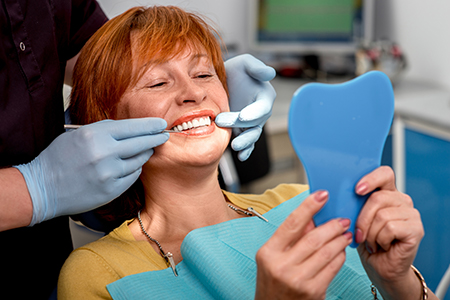Serving Avondale and the West Valley
Serving Avondale and the West Valley
Advances in dental materials and clinical techniques have made tooth replacement more natural and reliable than ever. While dental implants and bridgework remain important options for many cases, removable dentures continue to be a practical, time-tested way to restore a complete smile. Dentures can improve function, preserve facial support, and help people feel more comfortable in everyday activities like speaking and eating.
At the office of Summit Family Dentistry, we design and craft dentures using high-quality materials and precise laboratory methods. Our focus is on comfortable fit, natural appearance, and predictable function so that patients can rely on their dentures for daily life. We tailor each appliance to a patient's unique oral anatomy, bite, and cosmetic goals.
We make a point of explaining options clearly and customizing treatment plans so that each person receives a solution that fits their needs and lifestyle. Whether you are considering a partial denture to fill a few gaps or a complete set for a full arch replacement, we'll guide you through the clinical steps and expected outcomes.
Losing teeth affects more than the look of your smile. Missing teeth change how your bite functions, can make chewing less efficient, and may limit the variety of foods you can comfortably eat. These practical changes can, over time, affect nutrition and the way your jaw muscles and joints behave.
When teeth are absent, the surrounding bone and soft tissues gradually remodel. That process can lead to changes in facial contours, making the mouth appear sunken or collapsed in advanced cases. A well-designed denture helps restore support to the lips and cheeks, reducing visible signs of tissue loss and improving facial balance.
Beyond the physical effects, tooth loss often carries an emotional weight. Replacing missing teeth can restore self-confidence, make everyday communication easier, and remove the anxiety of speech changes or awkward tooth gaps. Dentures are one of the accessible ways to regain that normalcy for many adults.
Dentures are removable dental appliances consisting of artificial teeth set into a base that fits over the gums. They are designed to mimic the look and function of natural teeth while providing a non-permanent option for people who need to replace several or all teeth in an arch.
Because they are removable, dentures allow for simple home care routines—patients can take them out to clean both the prosthesis and the mouth. This accessibility makes it easier to maintain oral hygiene around any remaining natural teeth and the gingival tissues. Removability also means adjustments or relines are straightforward when tissue contours change.
Although fixed solutions like implant crowns and bridges are appropriate for many patients, dentures remain an important option due to their flexibility and adaptability. Modern dentures combine esthetic tooth selection with precise fitting techniques, offering reliable performance for everyday activities.

Selecting the appropriate denture depends on how many natural teeth remain, the health of those teeth, the condition of the gums and underlying bone, and your personal expectations for comfort and appearance. A careful clinical exam and conversation about goals are the first steps in choosing the best approach.
We evaluate jaw relationships, existing restorations, and the condition of supporting tissues to determine which style of denture will deliver the best long-term results. Sometimes a removable partial is the right choice to preserve healthy teeth, while in other cases a complete denture is necessary when an entire arch is being restored.
When appropriate, we discuss hybrid solutions that blend removable prosthetics with implant attachments to improve stability and retention. Every plan is individual; the goal is to balance comfort, function, and a natural appearance while considering the patient’s oral health.
Complete dentures are used when all of the teeth in the upper or lower arch (or both) are being replaced. They are crafted to fit the contours of the gums and the underlying ridge, with attention to tooth position, bite relationships, and facial support. A well-made complete denture restores the form and function of the arch while providing appropriate lip and cheek support.
A delayed, or conventional, complete denture is created after the natural teeth have been removed and the tissues have had time to heal. This approach often results in a highly accurate fit once healing is complete because the denture is fabricated to match the stabilized contours of the mouth. In some cases, this method is preferred for long-term comfort.
Immediate Denture
An immediate denture is placed at the time of extractions so the patient does not go without teeth during healing. While this option preserves appearance and basic function immediately after tooth removal, follow-up adjustments are typically required as tissues remodel.
Overdenture
An overdenture rests on the gum tissue but gains additional support by using remaining tooth roots or specially placed abutments. This design helps preserve alveolar bone and can provide improved retention and proprioception compared with a conventional denture.
Implant-Supported Dentures
Implant-supported dentures attach to dental implants or locator-style attachments in the jaw. This solution often offers greater stability and chewing efficiency while maintaining the removability that facilitates cleaning and maintenance.
Partial dentures are designed to replace one or several missing teeth while preserving healthy adjacent teeth. They stabilize the dentition and prevent unwanted shifting of remaining teeth, which helps maintain proper bite relationships and overall oral function.
Modern partials can be made from a range of materials, including lightweight metals, flexible resins, and hybrid frameworks that provide a balance of strength and comfort. The choice of material depends on the clinical requirements and the patient’s preferences for appearance and bulk.
A thoughtful partial denture design minimizes stress on the supporting teeth, integrates smoothly with existing restorations when necessary, and allows for straightforward hygiene routines. Properly designed partials restore chewing function and help maintain a healthy dental arch.
At each step, we consider how the appliance will fit with your lifestyle—how it will look, how it will affect speech, and how easy it will be to keep clean. Our approach emphasizes predictable fit and long-term tissue health.

The process of receiving a denture involves several carefully executed steps: a full oral examination, diagnostic records, impressions, and try-in appointments to verify fit, tooth position, and bite relationships. Attention to detail at each visit helps ensure the final prosthesis functions well and looks natural.
During the initial wearing period, it's normal to experience increased salivation, mild speech changes, and the need for a few small adjustments. These reactions typically settle quickly as your mouth becomes accustomed to the new appliance. We schedule follow-up appointments to address fit issues, relieve sore spots, and make any necessary occlusal refinements.
Adapting to a new denture
Adjusting to a new denture takes time for many people. We recommend gradual increases in wear time and practicing speech and chewing in a relaxed setting. Short, frequent practice with reading aloud or soft foods helps speed adaptation.
Cleaning and nightly rest
Keep the denture clean by rinsing after meals and brushing it daily with a denture brush. Remove the appliance at night to allow the tissues to rest, and soak the denture as recommended to preserve its shape and hygiene.
Follow-up and maintenance
Periodic checkups are important to monitor fit and oral health. Over time, tissue changes may require relines or other adjustments so the denture continues to fit comfortably and function effectively.

Comfort and longevity depend on proper fitting, routine care, and attention to oral health. Clean your denture daily, maintain the health of any remaining teeth and gums, and keep routine dental visits so small issues can be addressed before they become problems that affect fit or comfort.
If you are interested in exploring denture options, we provide a clear explanation of the clinical steps involved and what to expect at each appointment. We focus on solutions that restore function, preserve oral tissues where possible, and deliver an appearance you can feel confident about.
For personalized guidance and to learn more about which denture option may be best for your situation, contact Summit Family Dentistry to speak with our team. We are happy to answer questions and explain the process in detail so you can feel informed and comfortable with your care choices.

Today, it’s easier than ever to replace missing teeth and achieve natural-looking, durable, and long-lasting results! Depending on a patient’s dental needs, lifestyle, expectations of care, and budget, choices can include conventional fixed bridgework, dental implants, or removable partial and complete dentures. At the office of Summit Family Dentistry, we’ll discuss all your options in care and answer all your questions as you choose the solution that’s right for you.
With advances in dental materials and technology, today’s dentures are more comfortable and realistic-looking than ever before.
Whether you wear partial or complete dentures, it’s essential to see the dentist for routine care. Besides checking the fit and condition of your dentures and making any necessary adjustments, you’ll also receive a comprehensive exam to check on the health of any remaining teeth as well as the soft and hard tissues in and around the oral cavity.
A same-day denture offers an accelerated design and fabrication process that allows a patient to go from impression taking to denture insertion in a single day.
For patients who don’t want to wait after having teeth extracted, an immediate denture can be inserted the same day your teeth are removed. Sometime later you may need the denture relined to address any changes in its fit once the extraction sites have completely healed.
While no one wants to drop or break a partial or complete denture, accidents do happen. The good news is that in some cases, your partial or complete denture is reparable. It all depends on the extent of the damage. Don’t hesitate to contact our office if you’ve broken or damaged your denture. We’re happy to help.
The simple act of taking your partial denture in and out can cause certain types of metal clasps to loosen over time. When you come in for your checkup visit or contact our office for an adjustment, we’ll assess the fit of your partial and tighten the clasps for improved stability and comfort.
While rebuilding a complete smile is a worthwhile investment, our office is sensitive to the costs involved in dental care. We customize care and will discuss which treatment options address your needs, lifestyle, and budget. How much a new denture will cost depends on the type of the prosthesis, its design, and the materials used to fabricate the supportive base, teeth, and clasps or precision attachments. Dentures that include the placement of dental implants for added retention and stability typically involve additional costs.
If you have dental insurance, your coverage may include a new or replacement set of dentures. Our staff is happy to review your coverage with you to ensure you are maximizing your insurance benefits while minimizing any out of pocket expenses.
At the office of Summit Family Dentistry, we provide an extensive range of dental services, including the latest and most effective methods to help patients with missing teeth rebuild complete and beautiful smiles. As skilled and experienced professionals, we recognize that every patient is different, and every smile is unique. We’re passionate about what we do and take great pride in providing personalized treatment plans while treating our patients as valued partners in care.
Dentures are removable prosthetic appliances that replace missing teeth and the surrounding gum tissue. They are designed to restore chewing function, support facial contours, and improve speech when several or all teeth in an arch are absent. Dentures are appropriate for adults who need a nonfixed solution to restore a complete or partial smile.
Modern dentures are crafted to look like natural teeth and to distribute biting forces evenly across the tissues. They can be used as a long-term restoration or as an interim solution during healing after extractions. A clinical evaluation helps determine whether dentures are the best option for an individual patient.
Contemporary dentures are made from durable acrylic bases and esthetic tooth materials that mimic enamel in color and translucency. Partial frameworks may incorporate lightweight metals, flexible resins, or hybrid materials chosen for strength, comfort and fit. These material choices help reduce bulk while providing reliable chewing surfaces and a natural appearance.
Advances in laboratory techniques and digital workflows improve fit and predictability through precise impressions, occlusal records and try-in stages. Tooth selection, shade matching and arrangement are individualized to harmonize with the patient’s facial features. Skilled clinical and laboratory collaboration is essential to achieve a comfortable, functional prosthesis.
Common denture types include complete (full) dentures, partial dentures, immediate dentures, overdentures and implant-supported dentures. Complete dentures replace all teeth in an arch, while partials restore one or several missing teeth and help stabilize remaining teeth. Immediate dentures are placed at the time of extraction, and overdentures gain added retention from remaining roots or abutments.
Implant-supported dentures attach to implants or locator attachments to increase stability and chewing efficiency while remaining removable for cleaning. Each type differs in retention, stability and how it affects nearby tissues, so the appropriate choice depends on oral health, bone support and patient goals. A thorough exam and discussion of expectations guide the selection process.
The decision between a partial and a full denture depends primarily on how many natural teeth remain and the condition of those teeth. If healthy teeth can be preserved, a partial denture often provides a conservative way to restore function while preventing unwanted tooth movement. Conversely, a full denture is appropriate when an entire arch requires replacement or when the remaining teeth cannot provide adequate support.
A comprehensive clinical exam evaluates tooth vitality, periodontal status and the quality of the supporting bone and soft tissues. The dentist will discuss functional needs, cosmetic preferences and long-term maintenance so you can choose an option that balances comfort and oral health. Hybrid approaches that use implants to support partial or full prostheses are also considered when appropriate.
The denture process begins with a full oral examination, diagnostic records and a discussion of goals and expectations. Accurate impressions, bite registrations and try-in appointments are completed to verify tooth position, occlusion and esthetics before final fabrication. Attention to these steps helps ensure the prosthesis fits well and functions as intended.
After insertion, the initial wearing period often requires adjustments to relieve sore spots and refine the bite. Follow-up visits are scheduled to monitor fit and tissue response, and relines or minor repairs may be performed as tissues remodel. Ongoing preventive care and periodic evaluations help maintain comfort and function over time.
Daily care helps preserve the appearance and function of a denture and supports overall oral health. Rinse dentures after meals to remove loose food particles and brush them daily with a soft denture brush using a nonabrasive cleaner designed for dentures. Avoid hot water and harsh household cleaners that can warp or damage the denture base.
Remove the denture at night to allow the oral tissues to rest and soak the prosthesis in a recommended solution to maintain hygiene and shape. Continue to clean and examine any remaining natural teeth and the gums, and bring the denture to dental visits so the clinician can evaluate fit and perform professional maintenance as needed. Proper storage when not worn helps prevent accidental damage.
The lifespan of a denture varies with material quality, wear patterns and changes in the supporting tissues; many patients find that periodic maintenance is necessary over the years. Natural wear of denture teeth, gradual resorption of the jawbone and changes in soft tissue contours can all affect fit and chewing efficiency. Small repairs, relines and occlusal adjustments help extend function as these changes occur.
Regular dental checkups allow early detection of problems such as looseness, sore areas or difficulty chewing, and the dentist can recommend relines or replacement when indicated. Prompt attention to fit and comfort reduces the risk of tissue irritation and supports continued oral health. Proper daily care and timely professional maintenance also contribute to longer service life for the prosthesis.
Yes. Implant-supported dentures use one or more dental implants to retain and stabilize a removable prosthesis, combining improved function with the convenience of removal for cleaning. Implants can attach to the denture via bars, locators or other connectors, which greatly reduce movement and enhance chewing efficiency compared with conventional dentures.
Implant support can also help preserve jawbone and improve proprioception, giving a more natural feel during biting and speaking. Not every patient is a candidate for implants, so a clinical assessment of bone volume, overall health and treatment goals is necessary to determine suitability. When appropriate, implant-supported options offer a durable and predictable enhancement to traditional denture care.
Adapting to a new denture commonly involves temporary changes such as increased salivation, mild speech alterations and sensitivity in the tissues as they become accustomed to the appliance. Eating may feel different at first, so beginning with soft foods and practicing chewing on both sides helps build confidence and coordination. Short periods of reading aloud or speaking in private can speed speech adaptation and reduce self-consciousness.
Some minor sore spots or pressure areas are normal and are readily addressed with brief clinical adjustments at follow-up visits. Consistent wear and careful cleaning, combined with scheduled appointments to refine fit, help the mouth adjust smoothly. If persistent pain, instability or major speech issues occur, contact the dental team so the prosthesis can be evaluated and modified as needed.
Summit Family Dentistry has provided comprehensive restorative and family dental care in Avondale for more than 20 years, and our approach emphasizes individualized treatment planning and predictable outcomes. We combine clinical evaluation, modern laboratory techniques and patient-centered communication to select denture solutions that match functional needs and cosmetic goals. This focus on careful planning helps patients transition to comfortable, natural-looking prostheses.
During a consultation we review your oral health, discuss the full range of denture and implant-restoration options, and explain the steps involved so you know what to expect. Ongoing follow-up and maintenance are part of the treatment philosophy to ensure long-term comfort and function. If you would like detailed guidance on denture care or treatment planning, our team can provide a personalized assessment and answer your questions.

Ready to schedule your next appointment or have questions about our services? Our friendly team is here to help with everything from booking visits to answering questions about your treatment options. We’re committed to making the process simple and stress-free.
Whether you prefer to give us a call or fill out our convenient online contact form, reaching us is quick and easy. Don’t wait to take the first step toward a healthier, more confident smile—contact Summit Family Dentistry today!